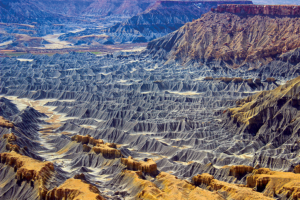Save Our Science, Save Our Planet
 Badlands National Park, South Dakota
Badlands National Park, South Dakota 2016 was the hottest year on record, 2015 and 2014 come in second and third, respectively, and 2017 seems like it’ll fall right in line. Yes, the planet is heating up and some Americans still seem to be wondering why that really matters. Besides the fact that rising temperatures are changing the earth’s climate, destroying ecosystems, disrupting agriculture, and contributing to the extinction of animal species, global warming puts us in danger, too. This is deeply concerning on its own, but the fact that the United States now has a leader who has no solution, doesn’t care, and will unquestionably accelerate the damage is downright terrifying.
Simply put, President Donald Trump and most of his cabinet seem to have no problem putting profits ahead of action to mitigate the effects of climate change. Within the first week of Trump’s presidency, the Environmental Protection Agency was told to remove climate change references from its website (an order that was later reversed, according to Science), the National Parks Service was seemingly punished for retweeting photos of Trump’s inauguration turnout, and the USDA’s Agriculture Research Service was pressured to stop releasing scientific data to the public. (At the rate we’re going, there are sure to be more dramatic turns by the time this is published.)
After the Industrial Revolution, we consumed resources as if they were never-ending. We trusted our politicians to steer us in the right direction, to keep in mind our best interests and the interests of our future. But now that many of us have become wise to the real-life dangers of non-renewable energy and overconsumption, we find ourselves at battle with those who have the most power to create change, many of whom are those same politicians who were too shortsighted to see, or accept, the dangers decades ago.
Acting on climate change is not an easy sell for many. It used to be that those who were dedicated to protecting the environment were just “tree-hugging hippies” or crazy, fear-mongering environmental scientists who were easily hushed by politicians and big business’ gentle reassurances to ordinary citizens that they needn’t relinquish the commodities and lifestyle they’d worked hard to afford. However, today the discussion on climate change is getting louder, as younger generations are refusing to allow the policies set by those who came before them to destroy their future.
Even scientists are becoming activists. A National Parks Service employee went rogue on January 24 after Trump ordered an agency-wide social media blackout. Using a Twitter account for Badlands National Park in South Dakota, a string of tweets were issued providing information about rising CO2 levels and other climate change threats. In fact, over a dozen government agencies have set up rogue or alternative social media accounts to disseminate scientific information they fear will be censored by the Trump administration. In another example of science activism, the political action committee called 314action (referring to Pi) helps people with backgrounds in science, technology, engineering, and medicine get the funds to run a successful political campaign.
There are things you can do too. According to a webinar offered in late January by the American Association for the Advancement of Science and hosted by former congressman Rush Holt and American Enterprise Institute Resident Scholar Norman Ornstein, ordinary citizens have a lot of power, but it takes work and the results are not as immediate. Some suggestions include contacting your representatives in Congress and urging them not to support anti-science legislation, helping scientific individuals get elected to political office at all levels, speaking to others about the benefits of scientific research and the real dangers and implications of climate change and science denial, and supporting scientific organizations.
“A new administration is in place, but it is worth reminding you that it is an excellent opportunity for young scientists and engineers to engage with many different audiences,” said Holt. “I think there’s a greater need than ever to explain the work that one does and explain why it’s important for expanding knowledge for improving human lives.” Holt also contended that while many in the scientific community have long held the belief that politics ended at the laboratory door, “that doesn’t seem to be true now.”
The People’s Climate Movement is organizing a march on Washington on April 29, 2017, to demand better jobs, justice, and not only recognition of but action on our climate problems. Like for the recent Women’s March, let’s get out there and show President Trump that real science cannot be silenced.
